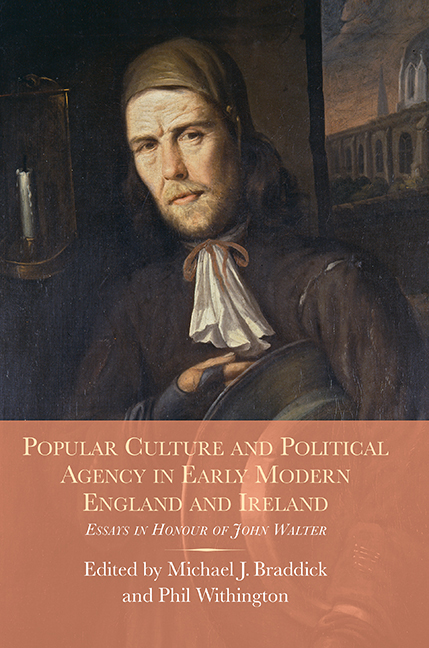 Popular Culture and Political Agency in Early Modern England and Ireland
Popular Culture and Political Agency in Early Modern England and Ireland Published online by Cambridge University Press: 09 May 2017
One of the perennial concerns of social, cultural and political historiography is the interrogation of the categories of ‘elite’ and ‘popular’ politics and their relationship to each other. This has gone hand-in-glove with the exploration of why and how different sorts of people engaged with politics and behaved politically. Historians have been particularly concerned with understanding how ordinary people framed political questions (for example, the languages they deployed and the ways in which they arrived at their understanding of the issues) and the actions available to them to act on that understanding (for example, the repertoires of individual and collective action, the legal and other means of asserting political agency). While such issues are timeless, they hold especial importance for a society like early modern England experiencing rapid political and social change. In English historiography in the 1970s and 1980s, however, the concurrent development of political revisionism and of the ‘new social history’ made the connections between these questions at once less clear but also more open to creative reinterpretation. On the one hand, historians of early modern English politics became very suspicious of accounts of political change which ‘reduced’ politics to a consequence of economic and social change, searching instead for explanations which placed greater weight on contingency and the logic of institutional procedures, and on the effects of religious and political ideas. On the other hand, social historians turned their attention away from the conflicts which dominated standard political narratives to the politics of everyday life: social relations in the household and the village. As a result, connections that had previously been made between the political and social history of early modern England were severed.
More recently, new connections have been found between these realms of experience. The deep roots of English governance and its reliance on broad voluntary participation meant that the actual exercise of power was relatively open to influence. Rumour, news and print, as well as official channels of communication such as assize sermons and royal proclamations, made the discourses of politics, and of particular political and religious debates, widely available.
To save this book to your Kindle, first ensure [email protected] is added to your Approved Personal Document E-mail List under your Personal Document Settings on the Manage Your Content and Devices page of your Amazon account. Then enter the ‘name’ part of your Kindle email address below. Find out more about saving to your Kindle.
Note you can select to save to either the @free.kindle.com or @kindle.com variations. ‘@free.kindle.com’ emails are free but can only be saved to your device when it is connected to wi-fi. ‘@kindle.com’ emails can be delivered even when you are not connected to wi-fi, but note that service fees apply.
Find out more about the Kindle Personal Document Service.
To save content items to your account, please confirm that you agree to abide by our usage policies. If this is the first time you use this feature, you will be asked to authorise Cambridge Core to connect with your account. Find out more about saving content to Dropbox.
To save content items to your account, please confirm that you agree to abide by our usage policies. If this is the first time you use this feature, you will be asked to authorise Cambridge Core to connect with your account. Find out more about saving content to Google Drive.